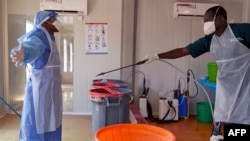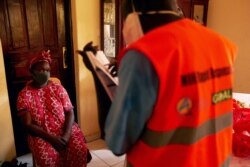The U.N. refugee agency is warning of potentially devastating consequences for millions in South Sudan if the COVID-19 pandemic takes root and spreads uncontrollably throughout the country.
South Sudan, the world’s youngest nation, was mired in war for decades before it gained independence in 2011 and for most of the time since. Years of conflict, floods, a recent swarm of locusts and other natural disasters have left millions of people unable to meet their most basic needs.
The U.N. refugee agency warns this weakened population might be unable to ward off the coronavirus pandemic.
To date, says UNHCR spokesman Babar Baloch, only 35 cases of the disease have been confirmed in South Sudan. But if the virus spreads rapidly, he tells VOA this situation could quickly turn into a humanitarian crisis.
“The threat of COVID, the pandemic, this would have deadly consequences for people where health structures are very weak, where 1.7 million people are displaced,” Baloch said. “The communal fighting is a real threat today.”
Baloch said the international community must step forward urgently and do something to prevent this from happening. He said the country’s health facilities have been largely damaged or destroyed during years of warfare.
He said internally displaced people are living in crowded sites with poor sanitary conditions. He said many people lack access to clean water and hygiene facilities.
Baloch said preparations to tackle the pandemic should be taken now while the numbers of infections are still low.
“This is the time that we want to use to put in place infrastructure or support authorities and people on the ground that they are well prepared in case the numbers are going to go up ... But let us not forget that the way this pandemic has been spreading,” Baloch said. “If you are not prepared we could see many lives in danger in South Sudan.”
The South Sudanese government has a high-level task force leading the battle against the coronavirus.
The task force said Wednesday that 28 people newly infected with the virus have been quarantined. It is urging South Sudanese to follow precautions meant to limit the virus’s spread.
Meanwhile, the U.N. refugee agency, working with South Sudanese authorities, has constructed five emergency treatment centers. Five more are set to be built in the coming weeks.
The agency says this and other assistance programs it is operating on behalf of refugees and internally displaced people are costly.
The UNHCR is appealing to international donors to be more generous than they have been so far, noting it has received only 11% of the $179 million it needs to meet the humanitarian needs of people inside South Sudan.





